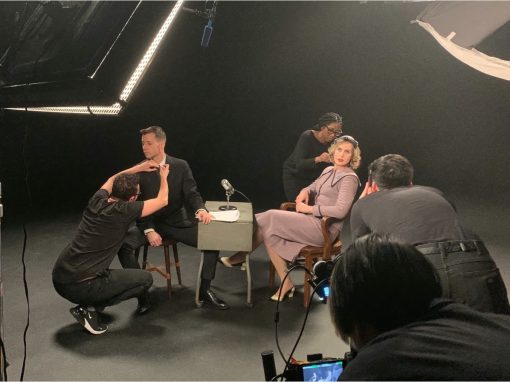“Men are dangerous at forty: at that age they get sentimental.” — One teen to another in “Adieu Philippine”.
Cinematheque Ontario in Toronto has kicked off its summer season. The highlights: French New Wave, Otto Preminger, Surrealism and the cinema, Jacques Tati, Jean-Pierre Melville, and leading ladies of Italian cinema.
Playing in the New Wave series is Jacques Rozier’s rare Adieu Philippine (1962). What a smart, lyrical and witty film this is! A young TV camera operator meets, befriends and tries to seduce two young women who are aspiring actresses. Upon the film’s release, both Rivette and Rohmer named it a masterpiece and Truffaut found a genius “in the balance between the insignificance of the events filmed and the density of reality.”
The film is also a great inventory of the ‘signs’ of a nouvelle vague film: slender plot with episodic unfolding; documentary-like hand-held camerawork; location shooting; a looseness of framing and composition; the ‘un-authoritarian’ camera often following the actors around rather than choreographing them; naturalistic dialogue; sexual candor, and so on.
But what makes this film distinctive is a through-line of theme not uncommon to New Wave films but elevated here to a masterful organizing principle: the gulf between young and old.
New Wave histories by Richard Neupert and Michel Marie tell us that France of the 1950s was deeply interested in the manners and mores of the postwar generation. The journalist Françoise Giroud coined the term “New Wave” in a series of articles she wrote in the magazine L’Express (the equivalent of Time or Newsweek). They summarized the results of a mammoth sociological survey of youth; 8 million people between the ages of 18 and 30 were surveyed. This was the generation, she wrote, that soon “will have taken France in hand, their elders taking leave, the younger ones helping them move out.” The survey, by training a microscope on the lives of the young, also exhaustively set that generation apart from the older one.
It is precisely this distance–even alienness–with which youths viewed adults that is enacted ingeniously in the very mise-en-scène of Adieu Philippine. Adults in this film generally fall into two groups: (1) they are seen but not heard, only the young being privileged with speaking parts; or, (2) when they do speak, they come off as foolish, sentimental, gauche or out of touch. (An exception is a great family dinner-table scene with Maurice Garrel.)
In one scene in an auto-repair shop, four teens kick the tires and size up a used car (“The tires are as bald as Yul Brynner”, “We’ll never pick up any girls in this jalopy”). As their raucous repartee flies back and forth, there’s a cut to an older mechanic who is looking on at them silent and google-eyed as if he plainly doesn’t comprehend what language they’re speaking. In another scene shot guerrilla-style at an airplane landing strip, a boy and two girls flirt and wisecrack with each other while adults (bystanders who happened upon the film’s shooting, no doubt) hover and stare at the youths, as if gaping at specimens of some strange species at the zoo. In one of the film’s virtuosic passages, two girl-friends are followed on a busy Paris street by a non-stop lateral tracking camera. Passing them is a stream of older people, but we hear only the girls, loud and clear, and none of the adults (the film has silenced them).
Of course, the keen awareness of one generation succeeding another is also an important aspect of the story of French New Wave cinema itself. The “young Turks” who led the New Wave revolt against “le cinéma de papa” were trying to make their voices heard loud and clear first through their criticism and then through their films. In 1958, after the L’Express survey, Pierre Billard, the editor of Cinéma, put together an issue of “Forty Under Forty,” in which he identified 40 young filmmakers to watch. The New Wave was being born.
Some other interesting or off-the-beaten-path films showing this season:
— In the surrealism program: She Done Him Wrong, Monkey Business (Marx, not Hawks), Pour Vos Beaux Yeux (Henri Storck), and Hans Richter’s narrative feature Dreams That Money Can Buy (I’d never heard of this but it sounds fascinating).
— A Preminger series that includes The 13th Letter, Margin for Error and Such Good Friends, although Skidoo is absent because the estate refused permission.
— Chabrol’s ultra-rare Les Godelureaux (1961), which I’ve hunted in vain for years.
— An eclectic “leading lady” Italian series.
Any thoughts/comments on the season’s films? Please feel free to share.
This just in: there’s a large, brand-new issue of Jump Cut now online.
pic: Adults in the foreground, youths in the background. We see the adults’ lips move but we hear no sound. Instead, the soundtrack is given over to the four young men.



Corey Creekmur
June 19, 2009 at 4:21 am
There's an excellent DVD of "Dreams That Money Can Buy" from the British Film Institute, but of course anyone should take the opportunity to see a rare, projected print!
http://filmstore.bfi.org.uk/acatalog/info_131.html
Michael
June 19, 2009 at 6:01 am
Girish — first, long time, no talk. How have you been? I'm currently convalescing after a brutal quarter. Second, I enjoyed this post, and it couldn't have been more timely. I recently watched Godard's Un femme mariee (actually, just working on a post about it when I saw this in my RSS feed) and, like so many of Godard's 60s films, it, too, is partly concerned with that distance between older and younger generations. The central character, Charlotte, seems disconnected from France's recent past and is focused entirely on its consumerist present — to the detriment of France itself, something that becomes increasingly clear as Godard includes references to the Vichy regime, to World War II and the Holocaust, and related events. In Godard's films, there's always this interesting dichotomy between his passion for youth culture and his genuine concern about young people's lack of historical and political references.
Which brings me to a question: would you say Rozier's emphasis on youth is an implicit statement either for or "against" it, or does it seem that Rozier is more matter-of-fact and observational? Maybe Rozier was mirroring the general changes in French culture at large — in a country that had gradually come out of the shadow of World War II, it would make sense to focus on the young, in part because of the promise of something new.
Jesús Cortés
June 19, 2009 at 6:53 am
Girish, if you liked "Adieu Philippine", check Marlen Khutsiyev´s "Mne dvadtsat let", a stunning Russian film of that period that contains one of the most beautiful opening sequence of the 60´s.
tom
June 19, 2009 at 7:56 am
I don't really know why, but it seems like a lot of movies I've been seeing lately have to do with aging.
I just saw Elegy with Sir Ben(!) and Penelope Cruz, and then Gran Torino (Eastwood). Both those films have aging characters who are very aware of it.
But then there's other where I was just reading into it; The Motorcycle Diaries, A Special Day (I don't know who did it but Sophia Loren's in it) Straight No Chaser (Monk's crazy, but that doesn't count) and Stop Making Sense.
How's the summer treating you, friend?
_roshen
Catherine Grant
June 19, 2009 at 10:01 am
Thanks for this post. I very much enjoyed Adieu Philippine, screened at the BFI some years back with an interesting intro by Michael Witt who talked compellingly of how innovative the production was with (TV style) multiple cameras on set. In an essay on the New Wave, T. Jefferson Kline has a good anecdote, too (in Ezra, E. ed., 2004. European Cinema. Oxford: Oxford University Press): 'When Jacques Rozler filmed Adieu Philippine (1963), the tape
recorder used on the set turned out to be defectlve and Rozier had to spend five months attempting to lip-read from the film's images what the largely improvised dialogue must have been.'
Anonymous
June 19, 2009 at 10:06 am
Girish, I'd try to see the difficult to catch Rozier movies, but without expecting anything as good and fresh as "Adieu Philippine"; "Dreams That Money Can Buy" seems to me incurably dated; and looking at the last issue of "Jump Cut" made me the impression of going back into the past by 35-40 years or so.
Miguel Marías
girish
June 19, 2009 at 10:50 am
Thanks, everyone!
Corey, I had no idea!
Michael, it's interesting: perhaps the film isn't consciously against the older generation, but it mostly only gives voice to the younger one, foregrounding them both in the mise-en-scene and the soundtrack. I know what a New Wave connoisseur you are–I think you'd love this film.
Jesus, Catherine, Miguel–thank you for the tips!
Tom, is that you, Roshen, from Delhi?! If so, I owe you a nice long catching-up email! I hope you've been well!
girish
June 19, 2009 at 10:51 am
Catherine has a great round-up post with links to new issues of Film Quarterly, Flow, etc.
girish
June 19, 2009 at 11:24 am
Catherine, your recounting of the Kline anecdote has me thinking about the soundtrack and dialogue–even the whole film–in a new light.
Peter Nellhaus
June 19, 2009 at 12:33 pm
Of the Italian series, I would take advantage of seeing Sandra, a Visconti film unavailable on DVD.
I finally saw Preminger's Fallen Angel which I liked a lot. Such Good Friends is currently unavailable on DVD, and I liked that film when I saw it over thirty years ago. Added bonus, I got to express my appreciating to Preminger himself at the screening I attended.
Adrian
June 19, 2009 at 1:22 pm
History has been very unfair to Rozier. ADIEU P has been seen as coming in at the 'end of the Nouvelle Vague', but it was 'ready to go' in 1962, when that tape recorder malfunctioned! He could have been at the centre of the NV – he ws admired by Godard, by CAHIERS, by everyone 'in the know' for his shorts – but got pushed right out to the periphery. His later features are sporadic – it has never been easy for him to raise money for his unusual projects – but all remarkable in one way or another, and often experiments with direct sound, real time, roving long takes, etc. A very 'musical' and vibrant, performance-based element in Rozier. Indelible personal memory: at the end of an afternoon screening of Lang's MOONFLEET in Paris, everybody at the end (from ages 8 to 80) was crying (me too). I stepped out into the light and looked over at the edlerly, well-dressed chap drying his eyes and sniffling into his handkerchief: it was Jacques Rozier.
Alexis Tioseco
June 19, 2009 at 3:19 pm
on a similar note as jesús cortés…
I just watched Marlen Khutsiyev's "July Rain", made a few years after "I Am Twenty" (which I haven't seen, but my girlfriend swears by), and would highly recommend seeing that as well. Also has an extremely beautiful opening. After seeing the film I googled Khutsiyev, and these two links came up, about Khutsiyev's first film in 15 years:
(1) http://www.kaltio.fi/index.php?725
(2) http://www.russia-ic.com/news/show/7635/
Anyone know anything about this?
Jesús Cortés
June 19, 2009 at 3:41 pm
Alexis, "Iyulskiy dozhd" is, like some Yoshishige Yoshida films in the 60´s much more stylized and owes many things "on purpose" to other authors. Resnais and even Ingmar Bergman comes to your mind inmediately. "I am twenty" is fresh, has a wonderful score, some of the best wet streets shots I´ve ever seen and drives to your bookshop to find Pushkin finest poems. Its opening sequence has a sublime and subtle use of DOF intrdcuing in one single shot the entire sense of the film. A must.
Alexis Tioseco
June 19, 2009 at 4:34 pm
jesús, you've sold me further. I'm on it.
(how nice it would be to convince the russian embassy here to sponsor a screening…)
Michael
June 19, 2009 at 6:03 pm
Girish, based on your post, I definitely think I would indeed love the film. I hope to have the chance to see it someday.
And, Adrian, that's a great story about Rozier and the screening of Moonfleet.
Dan Sallitt
June 20, 2009 at 2:51 pm
Wow, Les Godelureaux – I've never come anywhere near a screening of that.
There's a wonderful film in here that badly needs reappraisal: Antonio Pietrangeli's I Know Her Well. I've seen maybe four Pietrangeli films, enough to know that he's a strong director in general – but so far none of the others have matched this one.
I've always had a lot of reservations about Melville, but if the only films I'd seen were Léon Morin prêtre, Le silence de la Mer, and Les enfants terribles, I'd be a big fan.
I like Adieu Philippine, but I love Rozier's Du côté d'Orouët, which I've probably recommended to you before. There's an English-subtitled Rozier DVD coffret available, I think.
Nathan
June 20, 2009 at 3:18 pm
here's the link to the dvd box:
http://www.potemkine.fr/index.php?page=11&idprod=1892&menu=5
It does indeed have English subs…
Nicholas
June 20, 2009 at 11:49 pm
Iran!
girish
June 21, 2009 at 3:33 am
Hello and thanks, all! I'm on vacation in NYC until mid-week but will check in if I'm able to score some wi-fi…!
Anonymous
June 22, 2009 at 11:55 am
Certainly, as Dan points out, you should not miss the other Rozier movies, particularly "Du côté d'Orouët". And also related to Rozier, available on the web with English subtitles is Khutsiev's magnificent second feature (co-directed, as the first one, by Feliks Mironer). This 1956 film, "Vesna na Zarechnoí ulitse" (Spring on Zarecnoí Street) seems to mysteriously anticipate the New Wave. One wonders how Soviet film would have evolved if people like Khutsiev had been allowed to work freely and frequently.
Miguel Marías
Unknown
June 22, 2009 at 10:45 pm
Thanks Girish–very good take on Adieu. When Godard saw it at Cannes, his quote on it was "Whoever hasn’t seen Yveline Ceri doing the cha-cha in the eyes of the camera will no longer be allowed to talk of cinema sur la croisette." There's an amazing trailer on the Rozier box set that features a lengthy beach-party interview with Truffaut and the cast members and very awkward insert shots of Truffaut trying to laugh as hard as the rest of them before asking serious questions of composition.
My own favorite Rozier is Maine-Ocean, which has probably been shown about twice in America in the past 30 years, and Cahiers put as one of the top 10 films of the year. Entire thing is worthy of Hawks, Beckett, and the Marx Brothers, very much a cartoon come to quotidian life. But Rozier's features are all stunning–hard to imagine Celine and Julie without Orouet. In the past 23 years he's started making two more features, but had to stop both because he ran out of money (so I've heard). Supposedly, he's still waiting for money to complete the second.
Dreams that Money Can Buy is well worth the trip (I think). More dadaist than surrealist (Maine-Ocean is surrealist), technically, but even though it's an anthology the whole thing feels a bit like the film Michael Powell might have made if he had completely embraced the avant-garde–and I've never seen scarlets like that on film. Richter's probably the best of them–he's another one who needs a retro. Last year I got to see the North American premiere of his 1936 From Lightning to Television, which, amidst nationalistic filmmaking/politics the world over, imagines a globalized meta-world of news and discussions connected by electricity, ostensibly in the vehicle of radio, but very much a premonition of the internet. Richter assembles the film as a series of segments themselves connected "by radio"–sort of a way of giving structure to the non-structure of dadist vignettes, as well as an echo of the formats of newsreels. Probably worthy of Vertov in its innocent, revolutionary way.
Ignatiy Vishnevetsky
June 26, 2009 at 7:40 pm
I second David's mention of Maine-Ocean. Rozier is sometimes associated with Vigo. I didn't really understand the connection until I saw that film.